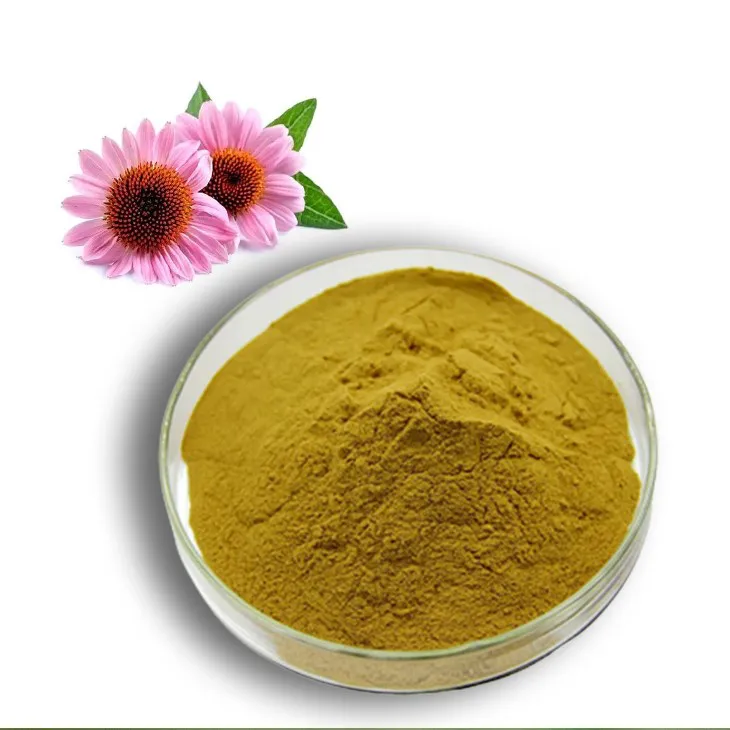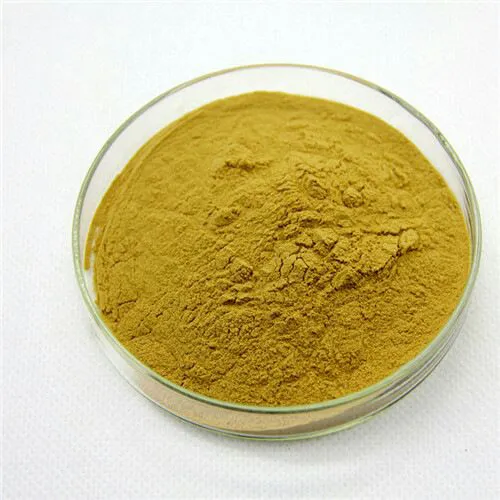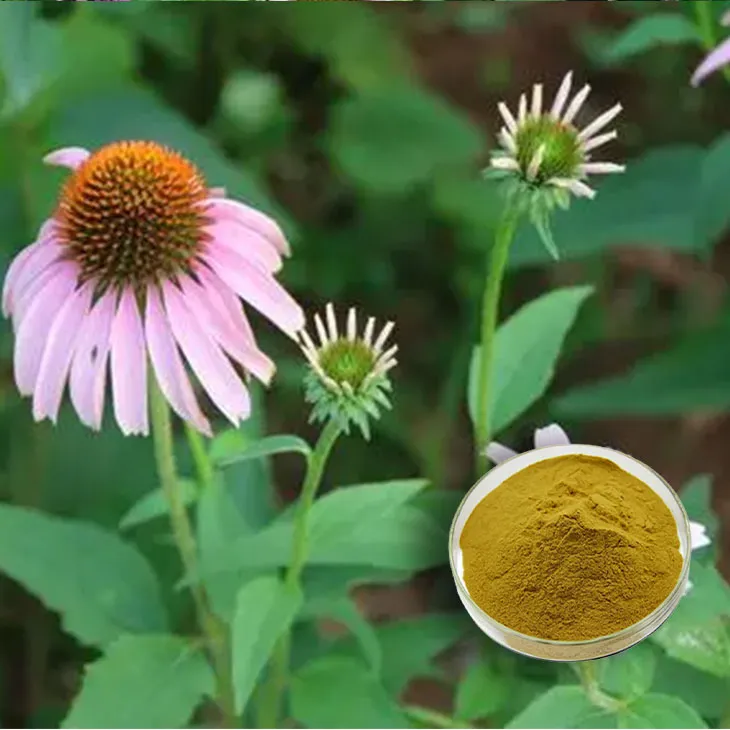- 0086-571-85302990
- sales@greenskybio.com
Echinacea Extract: Is the Extract Effective for Weight Loss?
2024-11-13

1. Introduction
In recent years, the pursuit of natural weight - loss aids has been on the rise. Among the many substances being explored, Echinacea Extract, also known as purple coneflower extract, has attracted attention. This article aims to comprehensively examine whether this extract can play a role in weight loss, taking into account scientific research, potential mechanisms, and associated factors, while also considering possible side effects and precautions.

2. What is Echinacea Extract?
Echinacea is a genus of flowering plants in the daisy family. The extract is obtained from various parts of the Echinacea plant, most commonly the roots and aerial parts. It has been traditionally used in Native American medicine for a variety of ailments, such as infections and wounds. It contains a complex mixture of active compounds, including alkamides, caffeic acid derivatives, and polysaccharides.

3. Scientific Research on Echinacea and Weight Loss
3.1 Animal Studies
Some animal studies have provided initial insights into the potential role of Echinacea Extract in weight management. For example, in a study on obese rats, researchers observed that when the rats were given a certain dose of Echinacea extract over a period of time, there were some changes in their body weight and body composition. The rats showed a tendency towards a reduction in body fat percentage. However, it is important to note that animal models may not fully replicate human physiological responses.
3.2 Human Studies
So far, the number of human studies specifically focused on Echinacea extract for weight loss is relatively limited. In a small - scale clinical trial, participants who took Echinacea extract supplements in addition to following a controlled diet showed a slightly greater weight loss compared to those who only followed the diet. But the differences were not statistically highly significant. More large - scale and long - term human studies are needed to draw more conclusive evidence.

4. Possible Mechanisms for Weight Loss
4.1 Anti - inflammatory Effects
Chronic inflammation is associated with obesity. Echinacea extract has known anti - inflammatory properties. The alkamides and caffeic acid derivatives in the extract can help reduce inflammation in the body. By reducing inflammation, it may potentially improve metabolic function. For example, it could enhance insulin sensitivity, which is crucial for proper regulation of blood sugar levels and energy metabolism. When insulin sensitivity is improved, the body is more likely to utilize glucose effectively instead of storing it as fat.
4.2 Appetite Regulation
There is some evidence to suggest that Echinacea extract may play a role in appetite regulation. It could potentially affect the hormones and neurotransmitters involved in the control of hunger and satiety. For instance, it might interact with ghrelin (the "hunger hormone") and leptin (the "satiety hormone"). By modulating these hormonal signals, it could lead to a reduction in food intake. However, the exact mechanisms by which it influences these hormones are not yet fully understood.
4.3 Impact on Gut Microbiota
The gut microbiota has been increasingly recognized as an important factor in weight management. Echinacea extract may have an impact on the composition and function of the gut microbiota. Some studies have shown that the polysaccharides in the extract can serve as prebiotics, promoting the growth of beneficial bacteria in the gut. Beneficial gut bacteria can play a role in digesting food more efficiently, producing short - chain fatty acids, which can provide energy and also have potential effects on body weight regulation.

5. Factors Affecting the Efficacy of Echinacea Extract for Weight Loss
5.1 Dosage
The dosage of Echinacea extract may significantly impact its effectiveness for weight loss. In animal studies, different dosages have led to varying results. In general, a higher dosage does not necessarily mean better results. Finding the optimal dosage range for humans is crucial. However, due to the lack of comprehensive human studies, the appropriate dosage for weight loss remains uncertain.
5.2 Duration of Use
Similar to dosage, the duration of using Echinacea extract is also an important factor. It may take a certain period of time for the extract to exert its effects on weight loss. In the few human studies available, the treatment duration was relatively short. Longer - term use may be required to achieve more significant and sustainable weight loss results, but this also raises concerns about potential long - term side effects.
5.3 Quality of the Extract
The quality of Echinacea extract can vary widely depending on factors such as the source of the plant, the extraction method, and the manufacturing process. High - quality extracts are more likely to contain the active compounds in sufficient quantities and in the right proportions. Low - quality extracts may not be effective or could even be harmful. Consumers should choose products from reliable sources with proper quality control.
6. Side Effects and Cautions
6.1 Allergic Reactions
Some people may be allergic to Echinacea. Allergic reactions can range from mild symptoms such as skin rashes and itching to more severe symptoms like difficulty breathing and anaphylactic shock. People with known allergies to plants in the daisy family should be especially cautious when considering using Echinacea extract for weight loss.
6.2 Interaction with Medications
Echinacea extract may interact with certain medications. For example, it may interfere with drugs that are metabolized by the liver, potentially affecting their efficacy or increasing the risk of side effects. People who are taking prescription medications should consult their healthcare provider before using Echinacea extract.
6.3 Immune System Effects
While Echinacea is often promoted for its immune - enhancing properties, long - term or excessive use may have unexpected effects on the immune system. There is some concern that over - stimulation of the immune system could lead to autoimmune disorders or other immune - related problems. This aspect needs further research, especially in the context of using it for weight loss.
7. Conclusion
In conclusion, while there is some evidence from both animal and human studies to suggest that Echinacea extract may have potential in weight loss, the current evidence is not conclusive. The possible mechanisms through which it could act on weight loss, such as anti - inflammatory effects, appetite regulation, and impact on gut microbiota, are promising areas for further research. However, factors such as dosage, duration of use, and quality of the extract need to be carefully considered. Moreover, potential side effects and interactions with medications cannot be ignored. For those interested in using Echinacea extract as a weight - loss aid, it is advisable to consult a healthcare professional before starting any supplementation.
FAQ:
What is Echinacea Extract?
Echinacea extract is obtained from the Echinacea plant, also known as purple coneflower. It has been traditionally used for various health purposes, such as boosting the immune system.
How could Echinacea Extract potentially aid in weight loss?
Some theories suggest that it might affect metabolism or appetite regulation. However, current scientific evidence is not conclusive. It could potentially interact with the body's hormonal or metabolic processes, but more research is needed to fully understand any weight - loss related mechanisms.
Are there any proven side effects of using Echinacea Extract for weight loss?
Common side effects may include allergic reactions, especially in those allergic to plants in the daisy family. There may also be some gastrointestinal discomfort. However, when it comes to its use specifically for weight loss, long - term side effects are not well - studied.
Can Echinacea Extract be used alone for effective weight loss?
It is highly unlikely that Echinacea Extract alone can lead to significant and sustainable weight loss. Weight loss is a complex process that typically requires a combination of a balanced diet, regular exercise, and overall healthy lifestyle changes.
How much Echinacea Extract should be taken for potential weight - loss benefits?
There is no established recommended dosage for using Echinacea Extract for weight loss. Since its effectiveness for this purpose is not proven, it is not advisable to self - prescribe high doses. Dosage for general health purposes can vary, but it is always best to consult a healthcare professional.
Related literature
- The Role of Echinacea in Health and Disease"
- "Investigating Herbal Extracts for Weight Management: A Review"
- "Echinacea: Traditional Uses and Modern Research"
- ▶ Hesperidin
- ▶ Citrus Bioflavonoids
- ▶ Plant Extract
- ▶ lycopene
- ▶ Diosmin
- ▶ Grape seed extract
- ▶ Sea buckthorn Juice Powder
- ▶ Fruit Juice Powder
- ▶ Hops Extract
- ▶ Artichoke Extract
- ▶ Mushroom extract
- ▶ Astaxanthin
- ▶ Green Tea Extract
- ▶ Curcumin
- ▶ Horse Chestnut Extract
- ▶ Other Product
- ▶ Boswellia Serrata Extract
- ▶ Resveratrol
- ▶ Marigold Extract
- ▶ Grape Leaf Extract
- ▶ New Product
- ▶ Aminolevulinic acid
- ▶ Cranberry Extract
- ▶ Red Yeast Rice
- ▶ Red Wine Extract
-
Clove Powder
2024-11-13
-
Bamboo Leaf extract
2024-11-13
-
Citrus Aurantium Extract
2024-11-13
-
Gynostemma pentaphyllum extract
2024-11-13
-
Purple Sweet Potato Extract
2024-11-13
-
Green Tea Extract
2024-11-13
-
Milk Thistle Extract
2024-11-13
-
Saffron Extract Powder
2024-11-13
-
Sea buckthorn oil
2024-11-13
-
Citrus Aurantii Extract
2024-11-13





















